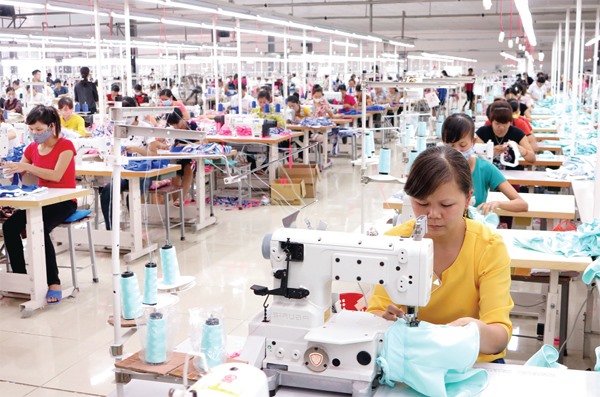Textile stocks have been on an temporary upswing thanks to the recent ratification of the EU-Viet Nam Free Trade Agreement (EVFTA) but textile enterprises still face difficulties due to heavy dependence on imported raw materials and machinery as well as reduced demand worldwide.

Textile stocks have been on an temporary upswing thanks to the recent ratification of the EU-Viet Nam Free Trade Agreement (EVFTA) but textile enterprises still face difficulties due to heavy dependence on imported raw materials and machinery as well as reduced demand worldwide.
In the latest trading sessions, from February 5 to February 14, shares of Duc Quan Investment and Development JSC (FTM) continuously increased with six session witnessing ceiling prices.
FTM soared by 38.01 per cent. During the same period, Song Hong Garment Joint Stock Company (MSH) also increased by 9.5 per cent, the Viet Nam National textile and Garment Group (VGT) rose 21.2 per cent.
According to Tran Xuan Bach, a stock analyst at Bao Viet Securities Co (BVSC), the ratification of EVFTA has boosted textile stock prices as the agreement is believed to offer a huge advantage to the industry.
“But this is only a short-term impact, textile firm can enjoy the benefits the agreement brings if they can meet market demand and expand production scale,” Bach wrote in a daily report.
“Under the tariff reduction plan, tariffs on most yarn and fabric products will be immediately exempted while tariffs on garments will gradually decrease to 0 per cent in 6-8 years,” said Ngo Tri Vinh, a stock analyst at BVSC.
“Subsequently, Viet Nam’s garment products will gradually decrease the price gap in line with Bangladesh (currently at 0 per cent tax) and gain advantages over China (12 per cent tax) while the preferential tax for Cambodia (0 per cent) is currently discontinued due to recent labour rights violations,” Vinh wrote in a daily report.
However, EVFTA’s impact in the short term will be marginal due to limited capability of material autonomy while EVFTA includes “fabric-forward” rule of origin, which means to enjoy preferential tariffs, the products must be made from fabrics of Vietnamese origin, he noted.
“EVFTA only opens opportunities for businesses with material autonomy as well as those with large EU groups of customers, such as TNG Investment and Trading JSC (TNG) and Thanh Cong Textile Garment-Investment-Trading Joint Stock Company (TCM)."
"EU is the largest market of TNG, accounting for 54 per cent of sales. For TCM, EU currently contributes only about 5 per cent of sewing revenue, however, with 60-70 per cent material autonomy, TCM is expected to meet EVFTA rules of origin,” Vinh noted.
According to SSI Securities Joint Stock Company (SSI), Viet Nam’s textile and garment industry is heavily dependent on importing of machinery and raw materials (60 per cent).
“Free trade agreements, on the other hand, impose strict requirements on the origin of products, demanding capability of material autonomy. Since few of Vietnamese business can produce raw materials, they can not fully exploit the benefits brought in by the FTAs”, SSI said.
The textile and garment industry will also face challenges caused by the novel coronavirus (COVID-19), the company said, adding that business activities of Vietnamese textile enterprises will be negatively affected as many China-based textile factories have been shut down since January. Currently, China is the largest raw materials supplier of Viet Nam.
According to SSI, textile stocks dropped sharply last year as businesses did not perform pretty well.
The Viet Nam National Textile and Garment Group (VGT) decreased by 10.9 per cent in 2019 due to poor business results.
VGT's net revenue reached VND18.4 trillion (US$792 million), down 3.4 per cent compared to the same period last year. Pre-tax profit reached VND671 billion, fulfilling 75 per cent of the yearly plan.
Post-tax profit touched VND628 billion, down 10.6 per cent compared to 2018.
Duc Quan Investment and Development JSC (FTM) witnessed shares plunged 88 per cent last year.
FTM net revenue recorded a decrease of 13 per cent compared to 2018, reaching nearly VND1 trillion. The company also recorded a net loss of nearly VND95 billion in 2019. Therefore, FTM only fulfilled 66 per cent of its revenue plan. — VNS





